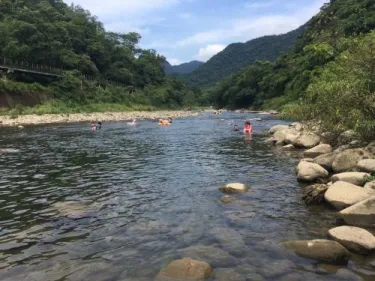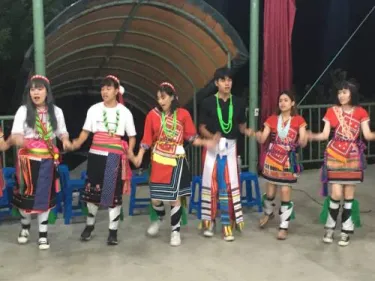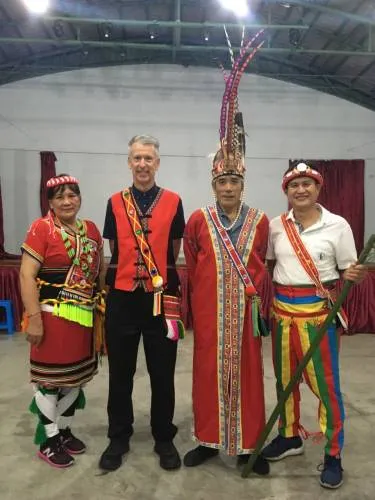Come Down to the River
A Letter from John McCall, serving in Taiwan
Subscribe to my co-worker letters
When churches or pastors invite me to come and speak at different events, I often am not exactly sure what the event is. Last year an aboriginal pastor from one of the Pastor Leadership Groups with whom I meet asked me to come and speak at their church’s weekend retreat. I agreed and didn’t ask many more questions. He told me that I would be speaking on Saturday afternoon and preaching at their service on Sunday morning.
Last week, he told me to take the Mass Rapid Transit to the last station, and one of the church members would pick me up and take me to the retreat center.
We left the station and began to wind up a mountain road. I had taken this road many years before, but ever since the new highway was built, this road has been the road “less traveled.” I found that it is now traveled by many motorcycle enthusiasts, so on Saturday morning, there were lots of folks out enjoying the fresh air. The island is packed with individuals and families who want to be out and about. Since the virus has been well-controlled here, the government encourages people to go out and spend their money as long as they wear masks and practice social distancing.

We arrived at the retreat center and drove down a narrow mountain road to a river. There we met the church members from the Amis tribe, who are one of the 16 official tribes in Taiwan. They are the largest tribe numerically and traditionally have lived along the ocean and been fisher folk. So, the fact that we were meeting along a river was very appropriate. I have been a clergy member of the Western Amis Presbytery (which includes most of the urban Amis churches) for twenty years, so I am very close to this tribe.
They were in the middle of group building exercises when I arrived, and I was impressed to see a lot of youth and young adults.
We then shared lunch together, and then we went to a meeting room where we held our afternoon worship. The praise team led us in singing, and then I stood up to preach. From the meeting room, we could see the river and the white water flowing through big boulders. As I looked out at the faces, I saw many folks I have known for many years. The name of this church is The Healthy Church, and it truly is a group of healthy Christians. I talked about the depth of God’s love for each one of them, and how God can use them to be a blessing in this time of uncertainty and challenge.
After our time of worship, the women worked on traditional beadwork. The tribal chief spoke to the youth about traditional ways of fishing and hunting. Since these youth have grown up in the city, they don’t have much experience with the traditional ways of finding food. It was a joy for me to see these city kids learning from the wisdom of their elders.
I then met with a young couple whose daughter I was to baptize the next morning. The young father is working on his Ph.D. at the University of Hawaii in the area of Political Science. His focus is on the self-determination of Taiwanese aboriginal people, including the issue of land rights. He grew up in a Christian home and celebrates the identity of aboriginals who are created in God’s image with a unique and precious culture. But he also recognizes how the indigenous people have been oppressed. It was a delight to talk with him and learn about this educational opportunity that God has given him.

That evening after dinner, we all gathered in a huge open pavilion for an evening of thanksgiving and celebration of the Amis culture. Every rural village has a harvest festival, but for these urban aboriginals, every year, they leave the city to come to this beautiful place beside the river to join in their traditional songs and dance.
It was a privilege for me to participate with them in this intergenerational thanksgiving event. Each fellowship group in the church presented its own unique dancing and singing. Then at the end of the evening, the chief led all of us in a huge dance, which moved us through the pavilion. There was joy on each face, and it was a beautiful thing for me to see the way, as marginalized people in Taiwan, they embody dignity in their identity as indigenous people and as God's children. Their natural sense of belonging and community is powerful in our isolated world.

They presented me with a new Amis vest and handmade bag that they use to carry their supplies and wear slung over one shoulder.
That evening the chief put his net in the river, and the next morning harvested a bucket full of fish.
Sunday morning, we worshiped again together and baptized the youngest member of the congregation. Her grandfather is an elder in the church and has been a friend of mine for 20 years. It is wonderful to see how he and his wife have passed on their strong faith to their children and now to their grandchildren. There was a depth of joy in that service in the singing, praying, and responding to God’s Word, which is always such an encouragement to me.
After worship, we had a cookout with eight different grills. Taiwanese aboriginals love to eat meat, so there was plenty of pork, chicken, and the newly caught fish to grill. Folks would go from grill to grill and try the different delicacies.
After the cookout, we all went down to the river to swim and enjoy the cool water on a 95° day.
When they took me back to the city to get on the MRT to journey home, my heart was full. It was full of the love which these people share with each other. It was full of the beauty of that place beside the river. It was full of faith, which is being passed from generation to generation in true and authentic ways.
It was a gift for me to be with the folks from The Healthy Church. They are living abundant lives, which are reflected in the abundant living water of that mountain river. Every time I am with them, they continue to teach me so much.
I continue to pray for you all in the U.S. and around the world as you face both the danger and opportunity of this pandemic.
Warmest blessings,
John McCall
